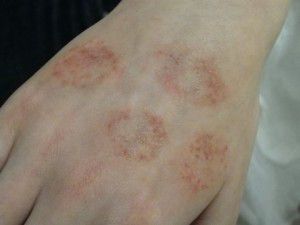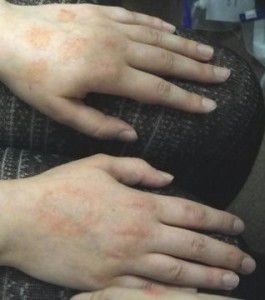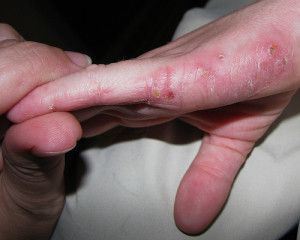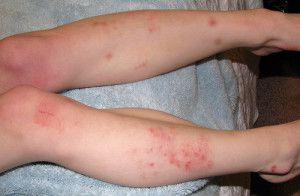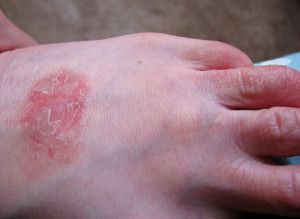Psoriasis (suh-RY-uh-sus) is a chronic (long term) skin disease resulting red, scaly and dry patches on skin; mostly concentrating elbows, scalp, knees and fingers. These patches may be small (mild psoriasis) or large (severe psoriasis).
In some cases psoriasis also affects joints; there will be no rash or bump on skin. This is called psoriatic arthritis, one among the 5 main types of psoriasis. Plaque psoriasis is most common type of psoriasis. Patches are caused due to rapid growing of skin cells which accumulate and form a silvery-white appearance. Fingernails and toenails are also affected by detaching nail plate; this is called psoriatic nail dystrophy.

Though we’ve lots more information about different types of psoriasis its causes are still unknown. Few experts say that over reaction of immune system and having psoriasis in families can cause psoriasis. Psoriasis is associated with cancer, diabetes and heart diseases. Why it’s associated and why it affects health is still unknown.
Good thing is it’s not contagious. When you come in contact with psoriasis effected person no need to worry. But it may spread to children, as it is termed as genetic disease (Wikipedia).
Stats on Psoriasis
Just to show how dangerous this disease can be, we’re sharing these stats.
- In US psoriasis is most prevalent autoimmune disease. (Autoimmune disease is a condition where your immune system attacks your body by mistake) (source: Nlm.nih.gov)
- 2.2 percent of world population has psoriasis.
- This skin disease affects mostly adults. Children and young people may have this condition.
- Psoriatic arthritis, a type of psoriasis effects people between 30-40 ages.
- It’s no more a cosmetic disease. Nearly 60 percent of people reported that this is a large problem in their lives.
- Quality of life is shattered.
What Causes Psoriasis?
The exact cause of psoriasis is unknown. Anyway, experts associate it with genetic disease and autoimmune disorder where immune system attacks your own body.
This result in forming of skin cells rapidly, normally it takes weeks for new cells to generate and old cells to shed but in this case on daily basis skin cells are generated. These over generated cells accumulate on skin forming dry, scaly patches. And when blood flows it form redness over these dead cells.
Also environmental factors may cause psoriasis.
How Psoriasis look like? Symptoms and signs of Psoriasis
Concentrating elbows, knees, lower back and scalp psoriasis forms red, flaky, thick silver patches. Anyway, any other area can be involved in this infection. These patches vary from small to large. In severe cases red, loose silvery patches are formed on skin.
Symptoms differ from person to person, depending on the severity of this autoimmune disease. People with severe psoriasis have to battle their everyday. Quality of life is completely shattered.
But don’t worry there are about 75 million Americans who’ve psoriasis.
Though there is no cure for psoriasis you don’t have to battle with it every day. There are different types of treatment to reduce psoriasis levels. Even people (85 -90 percent, approximately) with severe psoriasis reduced flare ups with varying treatments.
Treating Psoriasis
Psoriasis is not equal for everyone; you need to try different treatments to find the exact medicine which affect your psoriasis. So, we advice you to consult a doctor or dermatologist for diagnoses.
Different psoriasis treatments
- Topical treatments for Psoriasis, this involves directly applying on target area. This is the first type of treatment to try in diagnosis process.
- Biologic drugs, patients with severe to mild psoriasis are prescribed for this treatment. Biological drugs are given either by injection or intravenous infusion which targets specific parts of immune system.
- Systemic medications – when topical and light therapy fail to reduce psoriasis flare-ups oral medication is given. Unlike biologics this targets the whole immune system. Systemic medicine is given either by oral or injection or both.
- UV Light therapy – exposing psoriasis infected parts to UV rays can reduce flare-ups, but you need to be consistent to see the change. More about light therapy here.
- Complementary and Alternative – NCCAM (National Center for Complementary and Alternative Medicine) shows that 36 percent of Americans prefer complementary therapy for chronic diseases. This treatment involves both medical and health care systems which are not presently considered in traditional medicine.
Natural treatments
When all medical treatments fail to reduce flare-ups you can try natural remedies. This includes sunlight and ocean water. Aloe Vera, Oily fish, Dead Sea salts and cayenne are mostly used in natural treatments.
Read this: Natural remedies to treat Eczema
Having a healthy diet in no way treats psoriasis, but it can indirectly reduce agents causing psoriasis.
Psoriasis Pictures
References
- http://www.psoriasis.org
- http://www.webmd.com/skin-problems-and-treatments/psoriasis/
- http://www.medicinenet.com/psoriasis/article.htm

